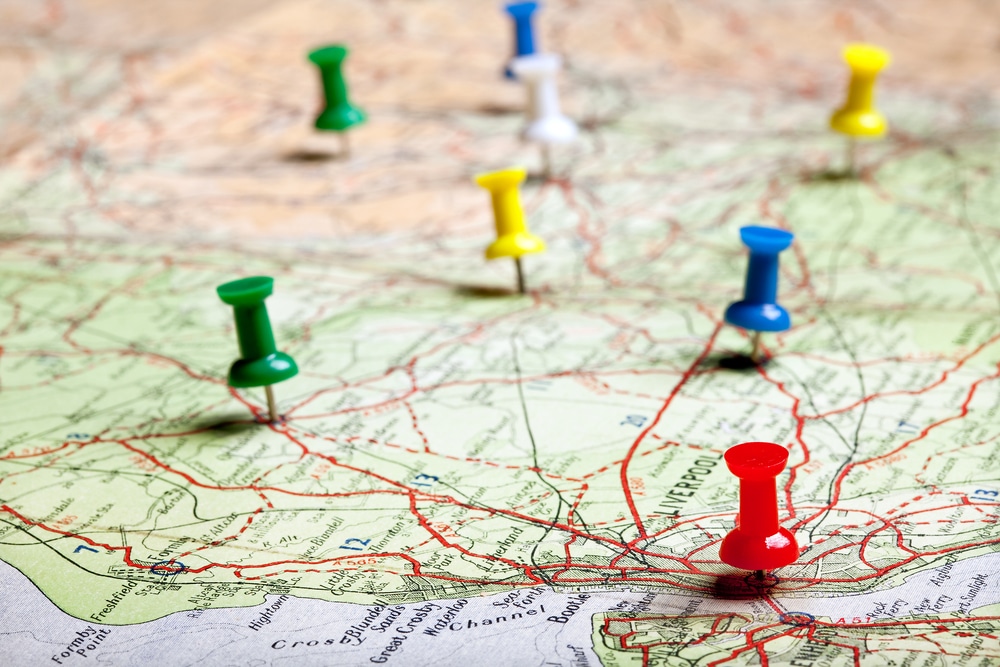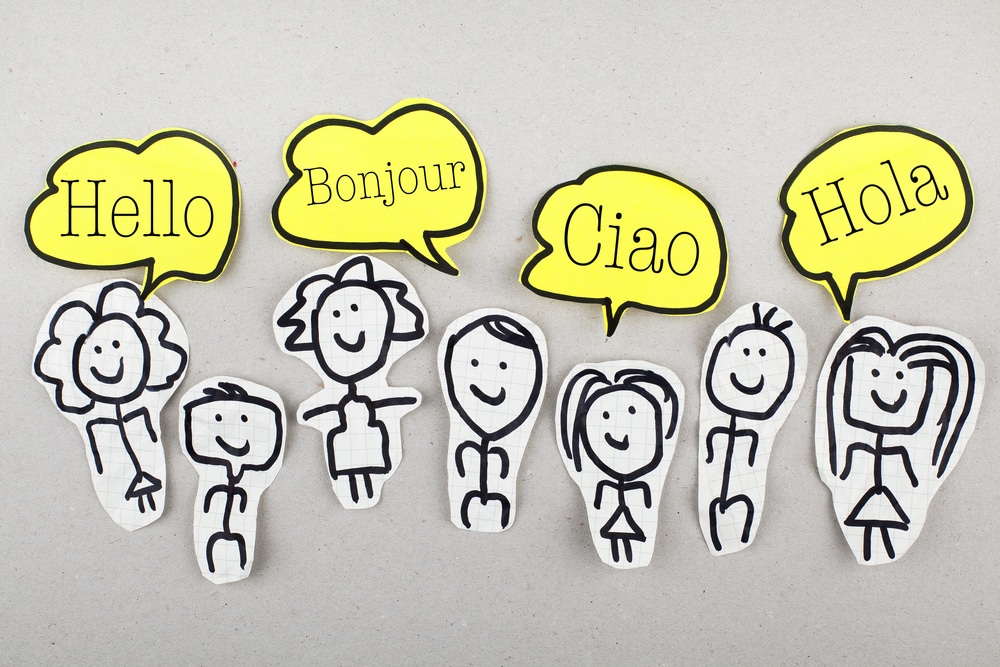
How to Introduce Yourself in French
What’s the most important first step when learning French?
Is it mastering essential daily French phrases? Is it getting down travel vocabulary?
But think about it: for the first conversations you’ll have in French, you’ll need to know how to say hello and introduce yourself.
These easy to use greeting words, phrases and questions will boost your French-speaking skills and give you confidence in your early French conversations.
Contents
- Simple French Introductions
- Basic Information About You in French
- French Pleasantries and Goodbyes
- How to Practice French Introductions in the Real World
- And one more thing...
Download: This blog post is available as a convenient and portable PDF that you can take anywhere. Click here to get a copy. (Download)
Simple French Introductions
French is a language that really embraces its greetings, so learning how to greet someone and introduce yourself is especially important in the language.
When you enter a boulangerie (bakery), épicerie (grocery store) or bistro (small restaurant), it’s generally expected that you greet the employees there even if you don’t necessarily require service at that time.
You can use the informal version with people younger than you or if you find that your conversation partner is referring to you as tu (you — informal), but it’s often best to start with the formal vous (you — formal).
| Greeting phrases | |
|---|---|
| Bonjour | Good day |
| Bonsoir | Good evening |
| Bon matin | Good morning |
| Bonne nuit | Good night |
| Salut | Hello |
| Âllo | Hello |
| Comment t'appelles-tu? | What is your name? [informal] |
| Comment vous appelez-vous? | What is your name? [formal] |
| Je m'appelle... | I call myself... |
| Je suis... | I am... |
| Et tu? | And you? [informal] |
| Et vous? | And you? [formal] |
| Enchanté | Charmed |
| C’est un plaisir de faire votre connaissance. | It's a pleasure to make your acquaintance |
| C’est un plaisir de vous rencontrer | It's a pleasure to meet you |
Once you’re feeling confident, check out a French greetings quiz from Quizizz or a more open-ended one from ProProfs to practice your French greetings.
Basic Information About You in French
Now that your conversation partner knows your name, they may want to know some more information about you! Sharing basic information is the first step to making French friends and acquaintances.
It’s always good to meet people, but French-speaking friends are especially valuable if you’re trying to learn the language. They can help you with tricky aspects of language-learning as well as introduce you to the culture of France and the Francophone world.
Locations
Q: D’où venez-vous ? (Where are you from? [formal])
Q: D’où viens-tu ? (Where are you from? [informal])
This question is generally asking for a country or region of origin, but you’re welcome to name your city or town if it’s a major or well-known one like New York City or London.
A: Je viens de… (I am from…)
Or you may be asked:
Q: Où habitez-vous ? (Where do you live? [formal])
Q: Où habites-tu ? (Where do you live? [informal])
A: J’habite à… (I live in…) and the name of the city where you live.
In return, to keep the conversation going, reply:
Q: Et vous ? (and you? [formal])
Q: Et tu ? (and you? [informal])
Are you interested in learning how to say country names in French? Practice with this quiz from Sporcle!
Age
As in many parts of the world, it’s sometimes perceived as impolite to ask about age in France, especially if you’re a man asking a woman her age. But if it does come up:
Q: Quel âge as-tu ? (How old are you? [informal])
Q: Quel âge avez-vous ? (How old are you? [formal])
To respond, you can say:
A: J’ai … ans. (I am … years old.)
You’ll notice that in French, you use avoir (to have) when talking about how old you are, not être (to be). So, it’s kind of like saying: “How many years do you have?” “I have … years.”
Occupation
Another common question that people will ask during introductory conversations is “what do you do for work?” In French, you ask:
Q: Quel est ton travail ? (What is your job? [informal])
Q: Quel est votre travail ? (What is your job [formal])
To answer, simple say:
A: Je suis… (I am) and state the job or profession.
Keep in mind that you don’t add the article “a” (un or une) before the job in French like in English. For example, you would simply say:
A: Je suis professeur. (I am a teacher.)
And in order to understand your conversation partner’s response, you’ll want to have a solid vocabulary base of French professions. To practice popular profession names in French, try this quiz from Lawless French.
Languages
Learning languages is fun, and since you’re learning French, you’ll probably get asked about what languages you speak. People may ask:
Q: Quelle langue parles-tu ? (What language do you speak? [informal])
Q: Quelle langue parlez-vous ? (What language do you speak [formal])
To answer, you say:
A: Je parle… (I speak…) and then name the language.
You can add multiple languages by linking them with et (and).
You can also say what languages you’re studying by saying
A: J‘étudie… (I am studying).
For example, as a learner, you might say:
A: Je parle anglais et j’étudie français (I speak English and I’m learning French).
Hobbies
Okay, your conversation is going well: you’re past the basics and now you need something interesting to talk about. This is a great time to discuss interests and hobbies. Someone may ask:
Q: Qu’est-ce que tu aimes faire ? (What do you like to do? [informal])
Q: Qu’est-ce que vous aimez faire ? (What do you like to do? [formal])
To answer, you can say:
A: J’aime… (I like) and then list a noun or a verb.
For example, I would say something like:
A: J’aime voyager, lire et étudier les langues étrangères. (I like to travel, read and study foreign languages).
You could also say:
A: Je m’intéresse à… (I am interested in) and then name a noun or two, such as: like,
A: Je m’intéresse à la culture française. (I am interested in French culture).
I would recommend looking up your hobbies and interests in French so you’re prepared, and then taking a look at this Sporcle quiz of common hobbies.
French Pleasantries and Goodbyes
All good things come to an end, don’t they?
When the conversation is over, you could simply say:
Enchanté (charmed) to indicate you’re happy to meet someone.
In formal contexts, you could say:
C’est un plaisir de faire votre connaissance. (It is a pleasure to make your acquaintance.)
C’est un plaisir de vous rencontrer. (It is a pleasure to meet you).
Note the difference in pronoun use here. In the first sentence, you are using the possessive pronoun votre (your), whereas in the second, you have to use the object pronoun vous (you).
To say goodbye, say:
au revoir (goodbye)
à bientôt (see you later)
À bientôt is less formal than au revoir, but I’d say it’s an appropriate way to say goodbye to your nouvel ami français (new French friend).
How to Practice French Introductions in the Real World
At this point, you may be thinking: sure, reading and typing these greetings is one thing. But what about when I actually want to say them?
We don’t all have the opportunity to step out the front door and introduce ourselves to a native French speaker. But that’s no excuse not to practice your French listening and speaking skills!
There are hundreds of online resources where you can learn and practice your French greetings: check out the language exchange apps HelloTalk and Tandem for meeting and greeting native French speakers through voice messages and calls.
FluentU takes authentic videos—like music videos, movie trailers, news and inspiring talks—and turns them into personalized language learning lessons.
You can try FluentU for free for 2 weeks. Check out the website or download the iOS app or Android app.
P.S. Click here to take advantage of our current sale! (Expires at the end of this month.)
And with that, my friend, I say adieu (goodbye)! You’re off to your first French conversations. Remember—every bonjour or bonsoir could be the first step in a friendship that lasts a lifetime.
Download: This blog post is available as a convenient and portable PDF that you can take anywhere. Click here to get a copy. (Download)
And one more thing...
If you like learning French on your own time and from the comfort of your smart device, then I'd be remiss to not tell you about FluentU.
FluentU has a wide variety of great content, like interviews, documentary excerpts and web series, as you can see here:

FluentU brings native French videos with reach. With interactive captions, you can tap on any word to see an image, definition and useful examples.

For example, if you tap on the word "crois," you'll see this:

Practice and reinforce all the vocabulary you've learned in a given video with learn mode. Swipe left or right to see more examples for the word you’re learning, and play the mini-games found in our dynamic flashcards, like "fill in the blank."

All throughout, FluentU tracks the vocabulary that you’re learning and uses this information to give you a totally personalized experience. It gives you extra practice with difficult words—and reminds you when it’s time to review what you’ve learned.
Start using the FluentU website on your computer or tablet or, better yet, download the FluentU app from the iTunes or Google Play store. Click here to take advantage of our current sale! (Expires at the end of this month.)










